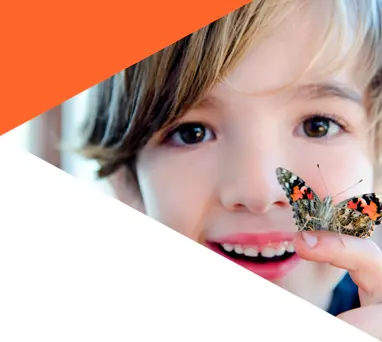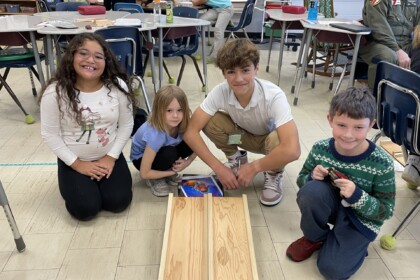
STEM AT SCHOOL

Peer Teaching Program Builds STEM Learning and Excitement in Falmouth

The Cross-Age Science Teaching (CAST) program debuted in Falmouth Public Schools in the mid-1990s through a Partnerships Advancing Learning in Math and Science (PALMS) grant, a statewide program designed to improve the teaching of mathematics and science in public schools. CAST is based on a peer teaching approach: eighth grade students become “science buddies” to third grade students and work together in a series of hands-on activities and demonstrations over three classroom visits.
The program is coordinated by Falmouth Volunteers in Public Schools (VIPS), a nonprofit based in Falmouth Schools that is celebrating its 40th anniversary this year. The mission of VIPS is to promote volunteerism, create impactful programs, and forge community partnerships. The CAST Program is one of VIP’s longest running programs.
For several years, the curriculum covered electrical energy to align with the third grade science frameworks. Now, the curriculum focuses on motion and the hands-on activities and experiments are used to reinforce concepts such as friction, gravity, velocity, acceleration and drag force. All four elementary schools in Falmouth participate in the program and 70 - 80 eighth graders sign up to participate.
VIPS Executive Director, Tracey Crago, spoke of the benefits of mentorship that are supported by research. “Peer teaching can improve students’ attitudes towards learning, foster a more personalized learning experience, lead to higher academic achievement, and help peer teachers gain confidence and build skills,” she said. Both the 3rd graders and the 8th graders see benefits of participating in the program.
“In Falmouth, the CAST program is considered an essential component of the third grade science curriculum,” Crago said. “One administrator witnessing the program in action commented ‘this is what teaching and learning should look like!’ "
The program coordinator for CAST, Grace Simpkins, described her favorite part of the program; she says, "I love seeing the excitement and growth in the 8th graders as they realize they can be role models, teachers, and lead the younger students. The 3rd graders love the individualized attention from their 8th grade “teachers” and have SO MUCH fun with the hands-on science! It’s a positive for everyone!"
The program is also popular with teachers. “The third graders look up to the eighth graders,” says Holly Gorham, a teacher at Mullen-Hall. “They consider them their friends and I think it empowers the third graders to know that “kids” can be in charge of learning and teaching as well as adults can.”
Kate Skehill of East Falmouth Elementary echoed the sentiment. “I love everything about CAST,” she said. “My students gain new role models and have a wonderful hands-on learning opportunity. The experimental and engineering thinking that the students are exposed to are invaluable!”
Tracey Crago believes that the program can be replicated in any school district. In Falmouth, a CAST program coordinator handles the curriculum development (in collaboration with 3rd grade teachers), scheduling (each session includes two after school training sessions for the 8th graders and three visits to the elementary school), transportation logistics, and managing the classroom visits. A small stipend for the program coordinator and the cost of supplies comes from grants. Volunteers assist with the training sessions and the classroom visits.
The most challenging part of coordinating, according to Crago, is “scheduling.” However, Crago believes that other schools, particularly those where 8th and 3rd graders may be on the same campus, might have an easier time getting the program started.
“Falmouth VIPS would be happy to work with any interested school district to set up a CAST Program,” Crago said. She can be contacted at tcrago@falmouth.k12.ma.us.